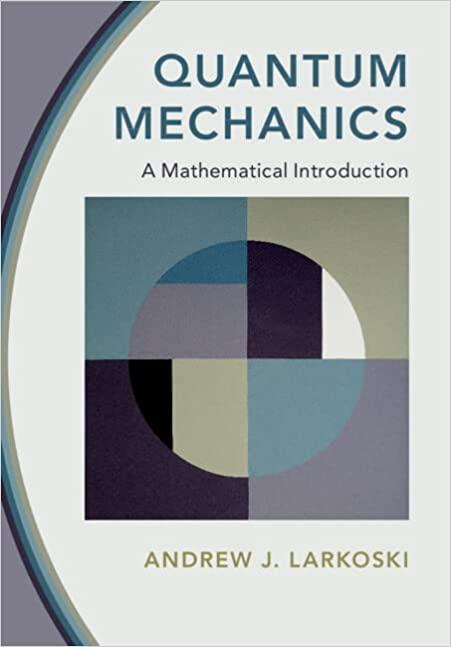In Sec. 5.1.3, we explicitly constructed the momentum operator as a matrix in the energy eigenbasis. For
Question:
In Sec. 5.1.3, we explicitly constructed the momentum operator as a matrix in the energy eigenbasis. For the infinite square well, the square of the momentum operator is proportional to the Hamiltonian, so we should just be able to square this momentum matrix and immediately read off its eigenvalues as the energies of the infinite square well. This is also one of the few examples that is simple enough to explicitly demonstrate equivalence between the wave and matrix formulations of quantum mechanics. \({ }^{4}\)
(a) Using the explicit form of the matrix element of the momentum operator in Eq. (5.34), express the matrix element of squared momentum operator \(\left(\hat{p}^{2}\right)_{m n}\) as an infinite sum.
\[\begin{equation*}\left(\hat{p}^{2}\right)_{m n}=-\frac{4 \hbar^{2} m n}{a^{2}} \sum_{l=1}^{\infty} \frac{l^{2}\left(1-(-1)^{m+l}\right)\left(1-(-1)^{l+n}\right)}{\left(m^{2}l^{2}\right)\left(l^{2}-n^{2}\right)} . \tag{5.79}\end{equation*}\]
(b) If the squared momentum matrix is to be proportional to the Hamiltonian, then in the energy eigenbasis it must be diagonal. Show that all off-diagonal matrix elements \(\left(\hat{p}^{2}\right)_{m n}\) with \(m eq n\) are 0 . For some values of row \(m\) and column \(n\) this is simple, given the expression in Eq. (5.79). What infinite sums must also vanish for \(\hat{p}^{2}\) to be diagonal? Can you show this?
(c) Now, let's determine the energy eigenvalues. From these matrix elements, the \(n\)th diagonal entry of the Hamiltonian \(\hat{H}\) should be
\[\begin{equation*}(\hat{H})_{n n}=-\frac{\hbar^{2}}{2 m}\left(\hat{p}^{2}\right)_{n n} \tag{5.80}\end{equation*}\]
Evaluating this directly for arbitrary values of \(n\) is a bit tricky, so instead we will satisfy ourselves with fixed values of \(n\) and then attempt to generalize. Let's consider just the first diagonal entry of the squared momentum operator, \(\left(\hat{p}^{2}\right)_{11}\). What is the infinite sum that you must evaluate for this matrix element?
Can you partial fraction expand each term in the infinite series into a sum of simpler terms? You might also need the value of the infinite series
\[\begin{equation*}\sum_{k=1}^{\infty} \frac{1}{(2 k-1)^{2}}=\frac{1}{1^{2}}+\frac{1}{3^{2}}+\frac{1}{5^{2}}+\cdots=\frac{\pi^{2}}{8} \tag{5.81}\end{equation*}\]
(d) Can you evaluate the infinite sum that defines \(\left(\hat{p}^{2}\right)_{n n}\) for arbitrary \(n\) ? See the Prentis and Ty paper for details.
Step by Step Answer:

Quantum Mechanics A Mathematical Introduction
ISBN: 9781009100502
1st Edition
Authors: Andrew J. Larkoski





